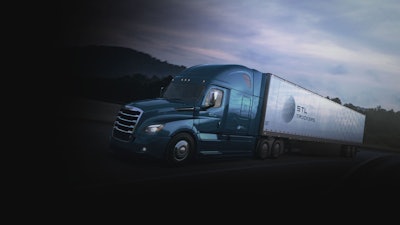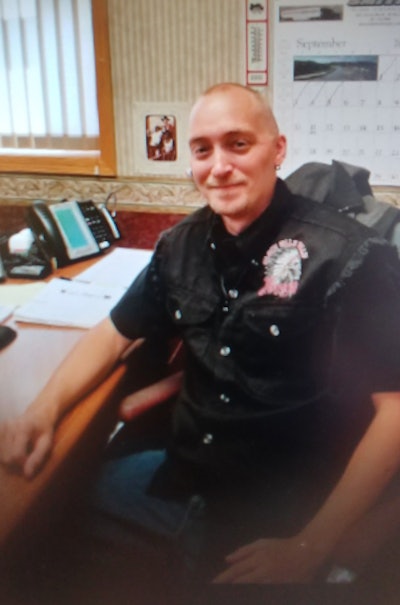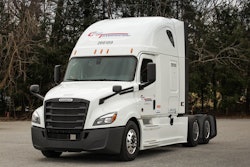
There is a common lament in the trucking industry that goes something like this: “That (choose one: cop, dispatcher, recruiter, regulator, congressman, compliance officer, shipper) has never been a driver, so how can they know what I do or what I need?”
Such is not the case for Thomas Barath, who is the recruiting/retention director for STL Truckers, a dry van carrier serving 48 states from its headquarters in St. Charles, Missouri. Barath, who joined STL Truckers around the first of this year, spent 16 years as an over-the-road driver, primarily hauling steel.
He joined the company as a recruiter. And in short order identified a need within the company, one that exists in many companies, and did something about it. At his urging, STL Truckers created a department to oversee retention, and hence his dual roles.
Barath says his background gives him an advantage dealing with STL Truckers’ 100 company drivers and the more than 500 or so owner/operators who haul for the company. He knows the problems drivers face, because he lived with them. He knows the concerns drivers have about pay and hometime and benefits, because he had them himself. And, he knows it’s important that drivers have someone to turn to when questions arise.
 Thomas Barath
Thomas Barath
“I used to be a steel hauler, which means I used to be a Teamster. I'm not a union guy anymore, but one thing that I took from the unions is it's always good for the driver to have someone to reach out to. The driver, if they're having issues and they can't get that issue solved with their direct dispatcher or even the operations manager, they should have somebody else that is going to act on behalf of them, that's going to (be) an advocate for drivers.”
One of the company’s recruiters was tapped to be that advocate. If a driver reaches out to them, that retention specialist can handle it, whatever the case may be, said Barath.
But, Barath sees his roles as more than recruiting drivers and solving their concerns. He also is one part cheerleader and one part goodwill ambassador for the men and women who drive for STL Truckers.
During the early days of the COVID-19 pandemic, truckers received the accolades they generally have not seen in the past. Strangers thanked them, organizations fed them, companies worked to ensure they had the personal protective equipment they needed. Trucks and truckers were even invited to and celebrated at the White House.
And, while much of that has faded as vaccinations have helped the seriousness of the coronavirus recede, Barath is intent on seeing STL Truckers are properly acknowledged on a regular basis.
“Driver appreciation is, in my opinion, not communicated enough,” said Barath, who at one point drove team with his wife. “Drivers don't get enough attaboys, and it doesn't take much to make drivers feel the appreciation.”
So his plan is to make the intent of National Truck Driver Appreciation Week a full time part of the STL Truckers culture. Barath is planning cookouts, picnics and similar celebrations for drivers and others at all of the company’s terminals. He’s also created a company store and is giving hats, jackets and other company swag to drivers.
And, he said, all of this is a small price to pay to offset some of the problems truckers face every day they’re on the road.
“From a driver's perspective, (they) we get ragged on by the shippers,” said Barath. “They get ragged on by the receivers. They get ragged on by the general public on the roadway. The Department of Transportation gets on us. I mean, it's just a constant gauntlet for drivers (to run).
“If the general public, or even a lot of people who are in the office were aware of how small of an effort they have to make just to show their appreciation, I think more would do it.”
Aside from calling on his own experience as a driver to solve problems, Barath also can turn to his marriage for some good insights. His wife Renae was a fleet manager for a company he recruited for before joining STL Truckers.
“Because she had been a driver, she had an understanding of what drivers do,” he said. “She knew where the drivers parked, what they were doing, how they were doing it, which made the relationship with the driver and the fleet manager a hundred times better. Not only that, but the other dispatchers in the room relied on her.
“The other dispatchers would go to her for advice or with questions, because she knew from a driver's perspective, what the drivers were looking at, what they were doing, what was required of them on the site that the dispatchers weren't aware of.”
And, for Barath, it’s personal; it’s about drivers as people.
“A lot of people don't realize the sacrifices that drivers are making,” he said. “And there's also a negative stereotype of drivers. A lot of people think that all they have to do is hold a steering wheel. All they have to do is just drive from point “A” to point “B.” A lot of people don't realize who some of these drivers are. There are ex-police officers, ex-military, ex-fireman. I mean, there are people from all walks of life, old CEOs of companies, to people who used to be homeless, living under a bridge.”
But, as Barath says, most often, other motorists or people on the street only see the truck and not the driver.
It’s not just members of the public that ought to pay more attention to truckers as people, but also recruiters -- folks like himself -- ought to as well. He appreciates that recruiters are under pressure to find and hire “X” number of drivers, and that turnover in the industry is high.
In spite or because of that, Barath says he’ll normally spend 30 to 45 minutes on the phone with a potential new hire. He said it's not enough to read a list of what the company offers. Barath tries to answer a recruit’s every question and explain what STL Truckers’ corporate culture is like. He explains how that culture is driven by retention more than recruitment.
He cites an example:
“A driver had a medical issue and he had to go home. It took weeks for the driver to get this medical issue resolved, but the company just let them go home. They didn't take the truck. I mean, sure, it costs them probably a little bit of money, but they didn't take the truck. And, the fact that they were so understanding, they probably earned the driver until the end of his career, just by being understanding during that period.
“If you make the job worth keeping, they’ll keep it.”
And, for Barath, his too is a job worth keeping.
“I do have my days where I miss driving a truck and getting on the open road, popping in an audiobook and getting lost in the story, '' said Barath. “But I enjoy my job. I have the opportunity to not just improve my day, but improve the days of a lot of guys and gals out there.
“I can improve their working environment. I can make the decisions to make their job at STL Truckers better.”












